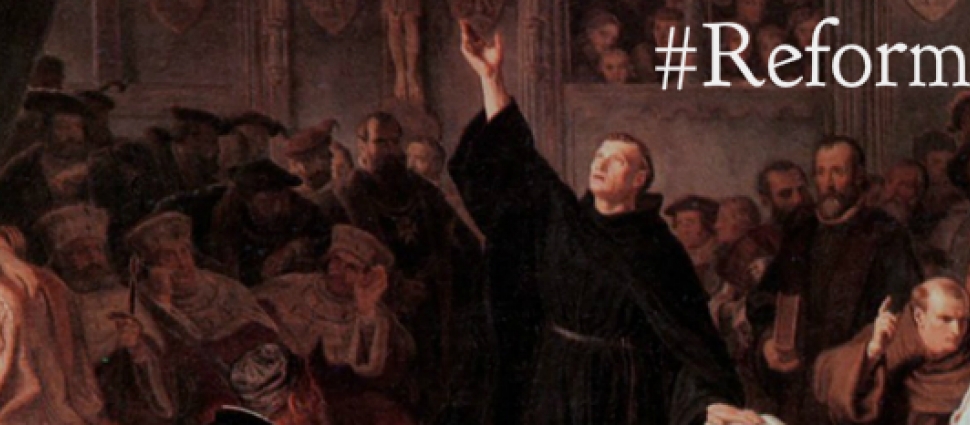John Jewel's "Challenge" to Rome (1)

Oct 19, 2017
It is no exaggeration to say that one sermon dominated anti-Catholic preaching in the first decade of Elizabeth’s reign, and that was the Bishop of Salisbury John Jewel’s Challenge sermon, first delivered on November 26, 1559, and again on 31 March 1560. But before we examine the sermon, we need to ask, who was John Jewel? Jewel is not well known among Anglicans today. Most readers of Meet the Puritans have probably heard of Thomas Cranmer, but John Jewel? But Jewel’s contribution to Anglican theology and the Elizabethan Puritan movement is of the same significance as Cranmer’s.
We’re in the midst of a study of the 39 Articles of Religion. We know that Archbishop's Cranmer in 1543 and Parker in 1563 were the authors. But who edited the final revision of them in 1571 when the Articles promulgated as our Anglican confession of faith? It was John Jewel. There were times in our study of the Articles that we examined corresponding sermons in the two Books of Homilies, for a fuller statement of Anglican doctrine. John Jewel was the editor the Second Book of Homilies. What is more, at the beginning of the seventeenth century, Archbishop Bancroft gave instructions that every parish church should have a copy of Jewel’s Apologia Ecclesiae Anglicanae on display in English so that all could read it. His Apologia was the defense of his Challenge sermon. Every Elizabethan Puritan would have been familiar with Jewel’s sermon and his subsequent classic work defining the Reformed Church of England.
St. Paul's Cross was a preaching cross and open-air pulpit in the grounds of old St. Paul's Cathedral in London. As an open-air pulpit of mostly timber with room for 3 or 4 inside it, set on stone steps with a lead-covered roof and a low surrounding wall. From here was preached much of the English Reformation, along with many major events in London's history. John Jewel was the first appointed preacher after a period of disuse in the transition between the reigns of Mary and Elizabeth. To get a sense of what it was like to hear a sermon like Jewel’s Challenge sermon live, visit the Virtual St. Paul’s Cathedral Project, a digital recreation of the open-air preaching in the St. Paul’s yard. The audio provides the experience of hearing Dean of St. Paul’s and poet John Donne’s sermon for Gunpowder Day, November 5th, 1622 in original pronunciation.
The Challenge sermon and the Apologia that followed were designed to convince the hearers to accept the Reformed position of the Elizabethan church and to abandon Roman Catholic practices. Jewel was a solidly Reformed theologian who wanted to define the new Church of England after Queen Mary as the Church which kept a two-tiered structure of authority: Scripture alone possesses magisterial authority. While tradition’s authority was always ministerial, it is subordinate. Tradition is subject to Scripture because only Scripture is the inerrant and infallible written source of God’s revelation to his people. Jewel challenges all comers to prove the Roman case from the Scriptures, along with supporting councils and Church Fathers from the first six hundred years after Christ.
Specifically, he uses his patristic knowledge to show that they, like the Anglican Church, based their teaching firmly upon the Bible. He writes in his Apology:
We receive and embrace all the canonical Scriptures, both of the Old and New Testament. And we give thanks to our God, for that he hath raised up unto us that light, that we might always have it before our eyes, lest we should, by the deceit of men or guile of evil spirits, be led away after errors and fables. These we acknowledge to be heavenly words, by which God hath laid open to us his will; upon these only men may repose their consciences; in these, all things whatsoever that are necessary to our salvation are abundantly and perfectly contained, as Origen, Augustine, Chrysostom, Cyril, have taught. They are the might and power of God unto salvation; they are the foundations of the prophets and apostles upon which the church of God is built; they are the most certain rule by which the church can be tried, if it wavers or err, and to which all doctrine ecclesiastical should be reduced; against them neither should any law, any tradition, any custom be heard,—nay, though Paul himself, or an angel from heaven, should come and teach otherwise [Apology, 39-40].
Jewel’s argument in his sermon is simple. He sets out the biblical principle of the sinful human corruption of godly worship and its necessary restoration according to the Word of God. Taking as his sermon text 1 Corinthians 11.23, “For I received from the Lord what I also delivered to you, that the Lord Jesus on the night when he was betrayed took bread, etc.," he suggests a parallel with their own time. Because of man’s sinfulness and rebellion against God, there is an inevitable corruption of divine worship as God commanded. In the same way Apostle Paul admonished the Corinthians for the errors that they had allowed to creep into their observance of the Lord's Supper and gave commands to prevent such corruption, this same command is relevant to English men and women today because the order for the Supper has been restored to the same order given by the Lord Jesus Christ and practiced for five or six hundred years throughout the catholic Church without exception. Jewel says he will explain why the Mass must be abandoned, and how those who “delight in it” have misread the Scripture and tradition of the Church Fathers. As his later ministry as Bishop attests, Jewel's concern is a pastoral one, so that the people of England may bring to God acceptable worship.
Next time we will look more closely at Jewel’s Challenge sermon.





